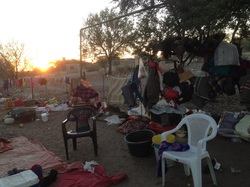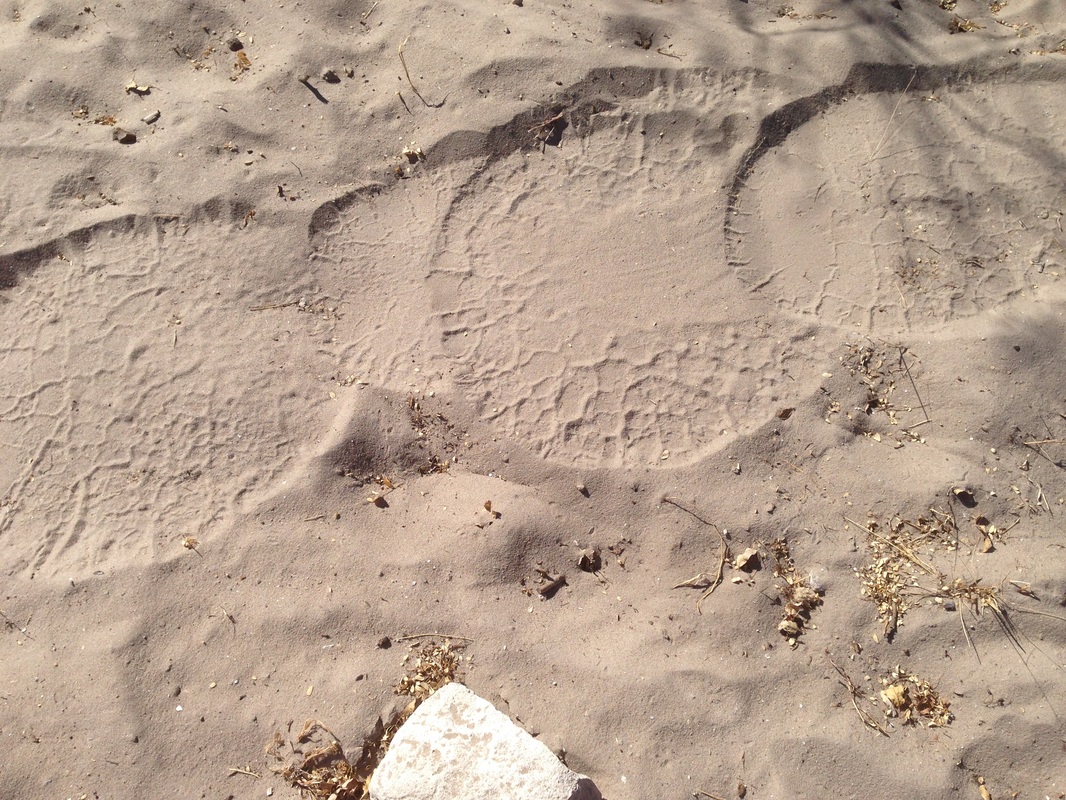 Sitting on a thatched terrace to write this, looking out at thornscrub lacy grey with Kalahari dust. Lots of red-eyed bulbuls hopping around in the baby baobabs planted around round and I hear the ubiquitous loeries crying 'Go’way' as someone nears their roost. Bushwalk this morning to take the sandwiches we make at breakfast to some hungry kids. In fact, everyone is hungry here: no money to buy food plus the drought and illegal herds of cattle and goats from the invading Herero pastoralists having denuded all bush food. However, one seldom encounters begging. Hawkers try to sell one beadwork or animal carvings, but they accept a refusal immediately. Food given to a San person is immediately shared. I see the sandwich, originally cut into four, divided and divided again until the 16 people who have materialized around the recipient, all have barely a mouthful. Tomorrow I must make two sandwiches, I tell myself, plus sneak some bacon and a boiled egg from the table. During the walk I spy big, crinkly footprints made by elephant who visited the water hole last night. Towards midnight I watched three young bulls materialize, drink their gargantuan fill, then melt away like hulking, grey ghosts – massive one minute, invisible the next. How do they do it? The lodge where I’m staying pumps precious borehole water into a pan to prevent the elephant from breaking into the camp to get at the water tanks. In the evening we call on Melissa’s ‘relatives’, a Ju|’hoan family whose aunt became Melissa’s ‘big name’, thereby adopting her, 25 years ago. The patriach is known as ‘Chief’ Bobo because he is the Tsumkwe delegate on the Traditional Council, a Namibian politico-civic organisation that ensures ethnic representation in national government. Chief Bobo’s family are town dwellers and have a small brick house, far too small to accommodate the extended family group they live in, judging by the number of sleeping mattresses outside. The one tree on the fenced-off property serves as storage space and is hung with blankets and clothing. It seems cooking is still done outside, as we see a woman squatting next to a frugal fire making maize meal porridge in a small, blackened pot. Some painfully thin dogs and a few tiny puppies snuffle around. They say the canine population is always an indication of food availability. Counting the protruding ribs on these mutts, I’d say things are bleak. The elderly matriarch, //Ui ce, seems serene. She and her handsome older sister are engaged in making beads from a bag of ostrich eggshell shards. They are using nail clippers to shape the beads rather than nibbling them into rounds, as in the past. Much better for their teeth, I’m sure. As the sun sets, adolescents flock home, chirping and giggling. Several of the girls are wearing candy-striped knee-high socks (the General dealer has just had a shipment in) it being a wintery 20 degrees. With their graceful necks and long pink legs, the San girls remind me of flamingoes. There is consternation here as an army base is to be built nearby and people fear for the safety of their girls. In this and other San areas, sexual harassment from other ethnic groups is a real and present danger. However, the base will mean employment for some Ju|’hoan people; having been forced into the cash economy, all need income. Another of the intractable problems the modern world has forced upon this ancient hunter-gatherer culture.
0 Comments
Leave a Reply. |
AuthorAfrican novelist and out-to-grass, academic. Archives
January 2024
Categories
All
|

 RSS Feed
RSS Feed